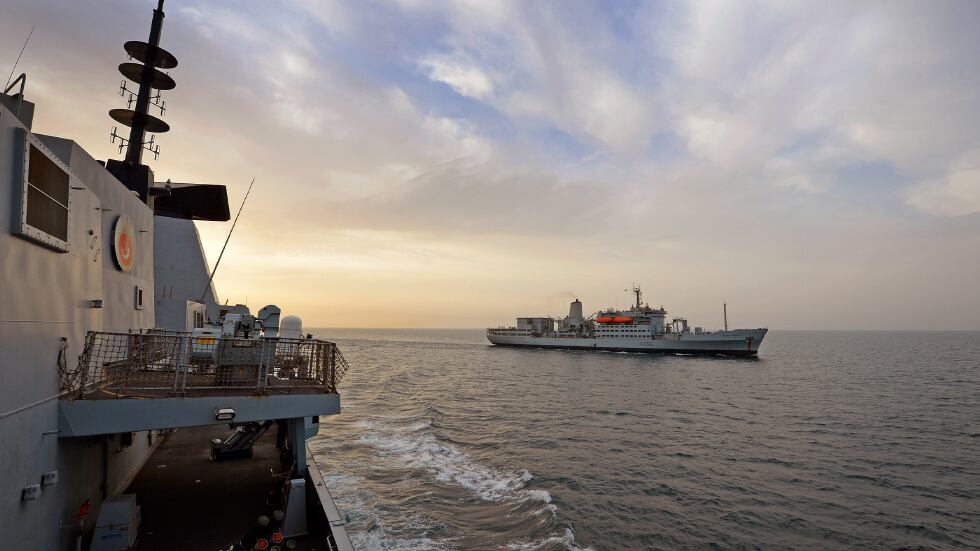LONDON — Britain is set to restart a competition later this year to build up to three large logistics ships to support deployment of the Royal Navy’s new aircraft carrier fleet, having suspended the procurement effort last year.
Ministry of Defence officials are refusing to give an exact date for the restart, despite Defence Secretary Ben Wallace recently telling the parliamentary Defence Committee that he thought it would take place in September.
“It will be, I think, in September, but I can correct that if I am wrong. We are hopefully going to reissue the competition sooner rather than later,” he told lawmakers.
A Defence Committee spokeswomen said the panel is still waiting on a concrete date from the MoD.
“Following the session with the secretary of state for defense, Ben Wallace, the committee wrote to the department asking for clarification on a number of issues, including the timing of the Fleet Solid Support program. The committee has not yet heard back from the Ministry of Defence,” she said.
The competition to build up to three 40,000-ton vessels in a requirement known locally as the Fleet Solid Support program was expected to have been worth as much as £1.5 billion (U.S. $1.9 billion) at the time the competition was unexpectedly terminated Nov. 5.
The MoD said at the time that it took the action due to a failure to find a value-for-money solution in negotiations with shipbuilders. In his evidence to the committee, Wallace described the program as “ effectively delinquent.”
The warships, which will be operated by the Royal Navy’s logistics supplier, the Royal Fleet Auxiliary, are a key element of Britain’s plan to replace aging Fort-class ships with modern support ships to supply ammunition, dry stores and spares to aircraft carrier strike groups and other maritime task groups.
The program had been mired in controversy since the Conservative government opted to open the design to international competition, rather that adopt a “Buy British” policy. The move caused an outcry from politicians, industry and unions who believed naval logistics vessels should be included in the list of warships, like frigates and destroyers, that are off limits to foreign shipbuilders.
RELATED

Ministers and procurement officials argued they had no choice but to follow European Union competition rules, which say logistics ships are not warships and are therefore subject to regulations requiring open competition.
Critics pointed out that other European Union member states have previously blocked foreign bids for similar ships.
Industry executives suspected the the cash-strapped MoD was running an open competition to keep the procurement cost to a minimum, following in the example of its purchase of four new fleet oilers for the Royal Fleet Auxiliary built by South Korea’s Daewoo Shipbuilding and Marine Engineering.
The U.K. has now left the European Union but is in a transitory period where trade rules still apply. That period is currently set to end Dec. 31.
The MoD declined to answer Defense News’ question on whether the new competition will be held under EU rules, or whether the U.K. will exempt itself from the rule, opening up the possibility for a British-only bid.
Defence Procurement Minister James Heappey told Parliament this year that the MoD is reviewing the procurement strategy, the requirements and the schedule ahead of the competition restart.
MoD officials said this week that the review is still underway.

Defense consultant Howard Wheeldon of Wheeldon Strategic Advisory said with the new coronavirus taking its toll on the country’s economy, there should be no question that the procurement is limited to local business.
“Having pulled the plug on the original plan, and with potential new U.K. players back in the fray, such as Harland and Wolff, the MoD would risk a very damaging backlash if it tried to do another foreign deal — and rightly so,” he said. “Buying on the basis of lowest cost is rarely the right solution for defense equipment procurement. The new world order that I see emerging elsewhere allows freedom to put national interests first. Thus for the U.K., the right decision on future solid support ships is that these vessels should be British-designed and -built.”
What about the original competition?
The MoD brought the original competition to a close on the eve of the Conservative government calling a general election for Dec. 12, 2019. Campaigners took that as a sign the government was moving toward a “Buy British” policy.
Their position was reinforced last autumn when the MoD published an updated, independent review of the nation’s national shipbuilding strategy, which advocated for a policy change that would see logistics ships and other types of vessels added to the list warships closed to foreign bids.
The review, conducted by former shipbuilding chief executive John Parker, said Britain was not currently adopting “the right strategic approach” in allowing ships like the fleet solid support vessels to be built overseas.
By the time the MoD suspended the competition, two of the five short-listed bidders remained: Navantia of Spain; and Team UK, a consortium of BAE Systems, Babcock International, Cammell Laird and Rolls-Royce.
A BAE Systems spokesperson told Defense News on Wednesday that the company is waiting for the MoD to show its hand on the procurement process, and in the meantime remains focused on its commitment to build Type 26 frigates for the Royal Navy.
“We are engaged with our U.K. partners and await guidance from the MoD on next steps in the procurement process for the Fleet Solid Support program. We have a long-term commitment to shipbuilding in the U.K. with continuity of production in Glasgow through into the 2030s, and we are focused on delivering our existing commitments,” the spokesperson said.
Andrew Chuter is the United Kingdom correspondent for Defense News.






